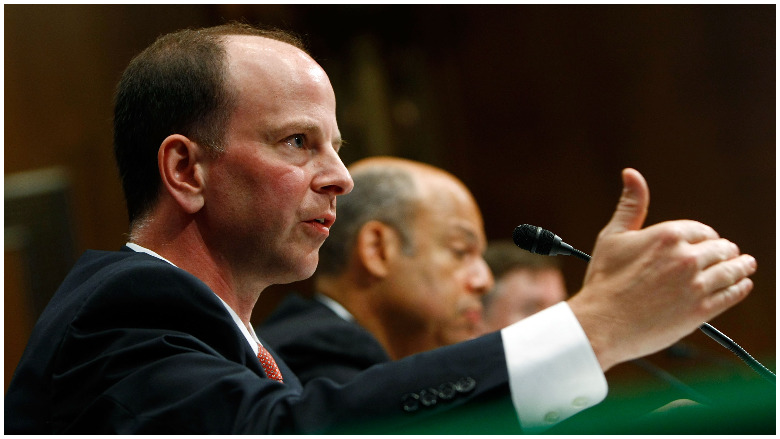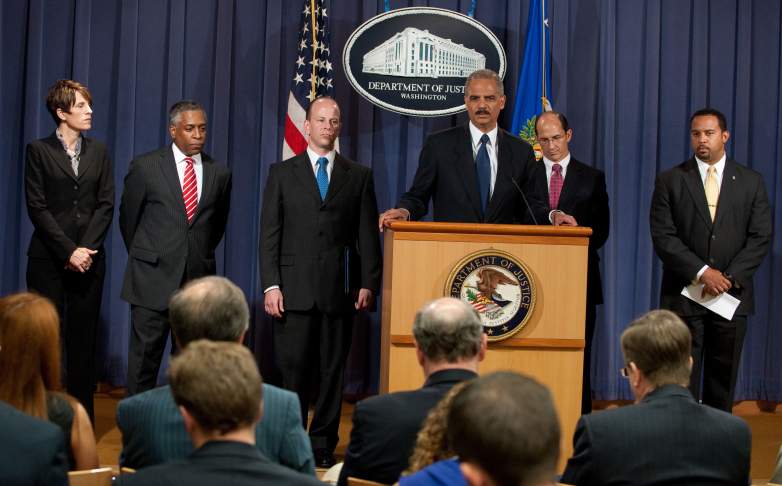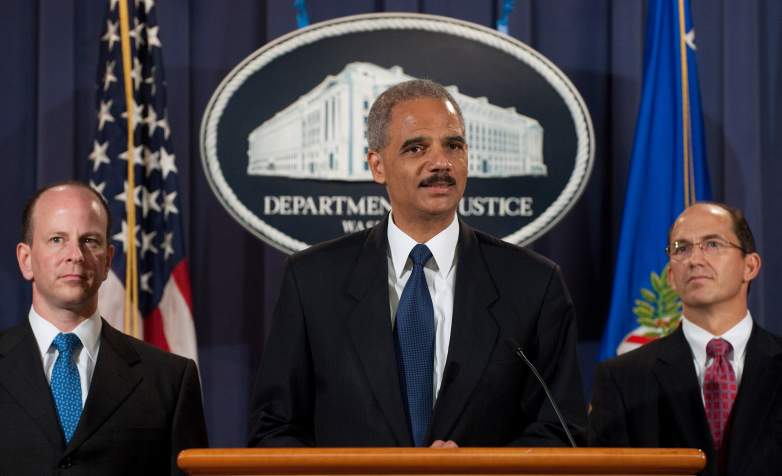
David Kris is a former Obama administration appointee, warrantless wiretapping critic, Justice Department official, and blogger who has criticized President Donald Trump and Republicans’ own criticism of the FBI’s FISA applications.
That Foreign Intelligence Surveillance Court has now tapped him to lead a review into the FBI’s proposed changes for how it handles FISA applications, and that’s not sitting well with the president and some conservatives.
On January 12, 2020, Kris found himself at the other end of a tweet by President Donald Trump. “You can’t make this up! David Kris, a highly controversial former DOJ official, was just appointed by the FISA Court to oversee reforms to the FBI’s surveillance procedures. Zero credibility. THE SWAMP! @DevinNunes @MariaBartiromo @FoxNews,” Trump wrote.
Here’s what you need to know:
1. The FISA Court Chose Kris to Review Changes Proposed by the FBI in the Wake of the Inspector General’s Report

David Kris
On January 10, 2020, Law.com reported that the secretive Foreign Intelligence Surveillance Court had appointed Kris “to review changes the FBI has proposed to its surveillance application process” after an inspector general’s report raised concerns about the FBI’s actions when seeking FISA warrants against Carter Page, a former Trump campaign adviser.
Law.com reported that the court considered five amicus counsel in making its decision. According to Law.com, the move comes after FBI Director Christopher Wray outlined changes he planned to make in the wake of the IG’s report, which you can read more about here. He was chosen by Judge James E. Boasberg.
Among other things, the report “identified significant concerns with how certain aspects of the investigation were conducted and supervised, particularly the FBI’s failure to adhere to its own standards of accuracy and completeness when filing applications for Foreign Intelligence Surveillance Act (FISA) authority to surveil Carter Page, a U.S. person who was connected to the Donald J. Trump for President Campaign. We also identified what we believe is an absence of sufficient policies to ensure appropriate Department oversight of significant investigative decisions that could affect constitutionally protected activity.”
The report said that “no political bias or improper motivation” influenced the decision to investigate.
The FISA court then responded with a sharply worded order. “This order responds to reports that personnel of the Federal Bureau of Investigation (FBI) provided false information to the National Security Division (NSD) of the Department of Justice, and withheld material information from NSD which was detrimental to the FBI’s case, in connection with four applications to the Foreign Intelligence Surveillance Court (FISC) for authority to conduct electronic surveillance of a U.S. citizen named Carter W. Page,” the FISA court wrote. “When FBI personnel mislead NSD in the ways described above, they equally mislead the FISC.”
Among other things, the court listed the following act: “While the fourth electronic surveillance application for Mr. Page was being prepared, an attorney in the FBI’s Office of General Counsel (OGC) engaged in conduct that apparently was intended to mislead the FBI agent who ultimately swore to the facts in that application about whether Mr. Page had been a source of another government agency… The frequency with which representations made by FBI personnel turned out to be unsupported or contradicted by information in their possession, and with which they withheld information detrimental to their case, calls into question whether information contained in other FBI applications is reliable.”
The court then ordered that the government shall, no later than January 10, 2020, “inform the Court in a sworn written submission of what it has done, and plans to do, to ensure that the statement of facts in each FBI application accurately and completely reflects.” Wray complied, and the FISA court’s judge picked Kris to oversee its compliance.
2. Kris, Who Was Nominated for a Key Post by President Obama, Criticized George W. Bush’s Warrantless Domestic Wiretapping

US Attorney General Eric Holder (3rd R) speaks during a press conference at the Department of Justice in Washington, DC, August 5, 2010, as he announces that fourteen US citizens have been arrested for seeking to join the Al-Qaeda-linked Somalia group Shebab. Standing alongside Holder are (L-R): US Attorney for the Southern District of California Laura Duffy; US Attorney for the District of Minnesota B. Todd Jones; Assistant Attorney General for National Security David Kris; Holder; FBI Executive Assistant Director, National Security Branch, Sean Joyce; and US Attorney for the Southern District of Alabama Kenyen Brown.
In 2009, the New York Times reported that President Barack Obama had “announced the nomination of a former government lawyer, who had been critical of the legal rationale for the Bush administration’s warrantless wiretapping program, to lead the Justice Department’s national security division.” That article was referring to Kris.
That article said that Kris had “served as a senior Justice Department official in both the Clinton and Bush administrations from 2000 to 2003.” He was described as “widely respected in Washington for his knowledge of intelligence law.”
The article states that Kris also worked on Obama’s “transition team at the Justice Department.”
Kris’s criticism of Bush dated to 2005 when the public learned he had approved an NSA wiretapping program. According to the Times, Kris churned out a “23-page legal analysis” that criticized Bush’s rationale for the program.
According to Legal Times, while at Justice, Kris’s duties included “supervising the department’s activities under the Foreign Intelligence Surveillance Act.”
On Twitter, Kris defines himself as “Culper Partners Founder. Fmr Asst AG for National Security, General Counsel Intellectual Ventures, Chief Ethics/Compliance Time Warner, Author, Law Professor.” On its website, Culpeper Partners describes itself as providing “strategic consulting at the intersection of public policy, security, geopolitics, communications and law.”
Kris’s bio on the website calls him an “expert in intelligence, law enforcement and security issues, he has more than 25 years of experience in government, the private sector, and academia.” He wrote the book, National Security Investigations and Prosecutions.
3. Conservatives Have Criticized the Selection of Kris, Especially for His Writings on the FISA Court & Devin Nunes, Whose Memo He Called Deceiving
Fox News called David Kris a “former Obama administration lawyer who has appeared on ‘The Rachel Maddow Show’ and written extensively in support of the FBI’s surveillance practices on the left-wing blog Lawfare.” The conservative Daily Caller site called Kris “one of the many pundits during the Russia probe to defend the bureau’s surveillance of Trump campaign aide Carter Page.”
The site further said that Kris was “an outspoken critic of Rep. Devin Nunes and other congressional Republicans who accused the FBI of misleading the Foreign Intelligence Surveillance Court (FISC) in applications to wiretap Page.”
The article on House intelligence chairman Nunes by Kris drawing the criticism picked apart a memo that Nunes wrote criticizing the FISA applications into Page. You can read the Nunes’ memo here and Democrats’ response to it here. It came out before the IG did find serious problems with the FISA applications.
The Kris article started out by saying: “The central irony of the memo prepared by House intelligence chairman Devin Nunes, we now know, is that it tried to deceive the American people in precisely the same way that it falsely accused the FBI of deceiving the FISA Court.” He also wrote: “The Nunes memo was dishonest. And if it is allowed to stand, we risk significant collateral damage to essential elements of our democracy.”
Daily Caller quoted Nunes as saying, “It’s hard to imagine a worse person the FISC could have chosen outside Comey, McCabe, or Schiff. The choice is shocking and inexplicable.”
According to Daily Caller, Carter Page also criticized the appointment, saying, “Nobody trying to fix the rampant abuse and coverup plaguing the entire FISA process would have picked Kris,” continued Page, who called Kris a “longtime FISA apologist.”
Others defended Kris. “This is deranged. David Kris wrote the literal book on FISA, has been a FISC amicus for years, and is one of the few voices trusted by both the left and right on national security investigative matters,” wrote Susan Hennessy, Lawfare Executive Editor (that’s the blog where Kris writes.)
4. As a Blogger, Kris Has Called the President’s Behavior ‘Shocking’ & Argued the FBI’s Russia Investigation Was ‘Unavoidable’

US President Donald Trump arrives for a “Keep America Great” campaign rally at Huntington Center in Toledo, Ohio, on January 9, 2020.
Kris says in his company bio that he “is a member of the board of directors and a Contributing Editor of the Lawfareblog, adjunct professor at the University of Washington Law School, a University Affiliate at Georgetown University, a member of the advisory boards for the National Security Institute (NSI) at George Mason University and the Tech, Law, Security (TLS) Program at American University, and a member of the Assembly: Disinformation Program at Harvard’s Berkman Klein Center.”
You can read some of Kris’s opinion articles here and decide for yourself how they break down. In an article on January 12, 2019, he argued that the FBI’s Russia investigation into President Trump’s campaign was “unavoidable.” Fox News called Lawfare a blog run “by Comey friend Benjamin Wittes.”
“There is a lot of information in the public record, much of it recounted in the Times article, about the president’s unusual behavior with respect to Russia,” he wrote. “But, of course, on another level it is terribly shocking—and just plain terrible—that the president has behaved as he has, and that the FBI is investigating him.” In that column, Kris added: “Although I find the president’s behavior shocking, I am not shocked, or at least not surprised, at the FBI’s investigative response.”
In 2018, Kris slammed Trump after the president named Matthew Whitaker as acting Attorney General. “For President Trump, who I believe typically views the world through the straw-sized aperture of his own self-interest, Whitaker’s loyalty, demonstrated through often-expressed hostility toward Robert Mueller’s investigation, is an affirmative reason to appoint him.”
He has written extremely lengthy articles dealing with the FISA court and even the Inspector General’s findings. You can read one of them here. He concluded that article by writing, “I worry that in the not-too-distant future we may find ourselves on the other end of the familiar national-security pendulum swing, reviewing a new inspector general or other report—this time criticizing the Justice Department, the FBI and/or the intelligence community for the proliferation of red tape or other restrictions, and the failure to stop an attack or other grave, hostile acts committed against our national security.”
Kris has also written on Twitter about the FISA court and the IG’s findings. Some of his tweets:
“First, the report repudiates the claims of a coup and related deep-state conspiracies in the FBI as advanced by President Trump and his supporters.”
“The IG found no improper purpose, political bias, or First Amendment concerns with the conduct of any of the investigations or with the FISA applications.”
“In particular, the investigations:
* had an authorized purpose and proper predication;
* were not based on political bias or improperly on free speech;
* properly began with less intrusive techniques before graduating to more.”
“Given the immense seriousness of these claims – the idea that our security services might exert political bias to undermine a political campaign – and the vigor with which they have been promoted, this is the most important take-away from the IG’s report. But second, the report finds multiple and significant errors in the conduct of the FBI investigation, and in the FBI’s handling of the FISA applications, as well as areas for improvement in FBI procedures.”
He also wrote, “These FBI errors weren’t political, the IG concluded, but neither are they acceptable, particularly in an investigation involving a presidential campaign.” You can find his full Twitter account here.
In November 2019, he retweeted a tweet from pundit David Frum slamming Trump as a liar. Frum had written, “I wrote about this in Trumpocracy. Politicians equivocate, avoid straight answers that might prove inconvenient later. Trying not to speak untruth, they sound dishonest. Trump never equivocates. He flat-out lies, but at least ‘doesn’t talk like a politician.'”
5. Kris Worked for a Private Investment Company, Time Warner, Inc. & a Cybersecurity Firm

GettyUS Attorney General Eric Holder speaks alongside Sean Joyce (R), FBI Executive Assistant Director, National Security Branch and David Kris (L), Assistant Attorney General for National Security, during a press conference at the Department of Justice in Washington, DC, August 5, 2010.
Prior to forming Culper, Kris’s bio says, Kris “was for six years the General Counsel of Intellectual Ventures, a privately held invention investment company with more than $6B under management and offices in the United States, Europe and Asia. He was also the Deputy General Counsel and Chief Compliance officer of Time Warner, Inc., the network and media company. He is currently an outside advisor to Cybereason, the cybersecurity firm.”
In his company bio, Kris says he “was the Presidentially-appointed and Senate-confirmed head of the Department of Justice’s National Security Division, with responsibility for all federal espionage and terrorism investigations and prosecutions and use of the Foreign Intelligence Surveillance Act; a senior advisor to Republican and Democratic Attorneys General and Deputy Attorneys General; and a federal prosecutor for more than eight years. He currently serves on advisory boards for two elements of the U.S. Intelligence Community and as an amicus curiae to the two Foreign Intelligence Surveillance Courts.”
